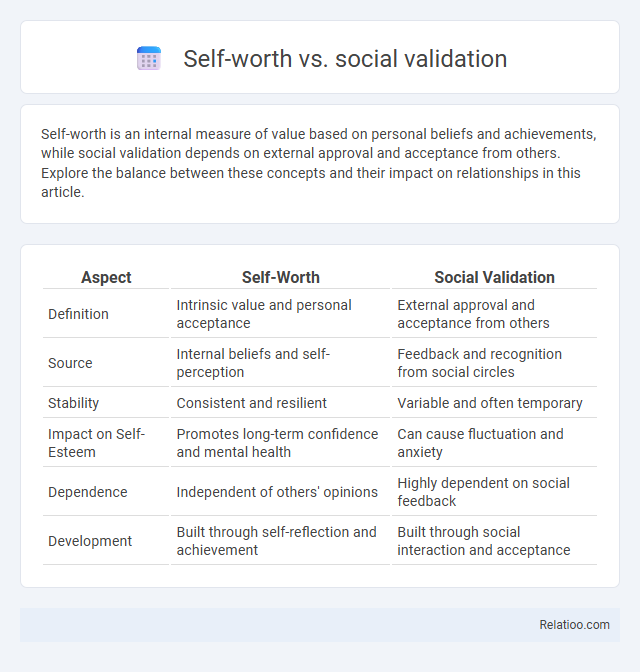Self-worth is an internal measure of value based on personal beliefs and achievements, while social validation depends on external approval and acceptance from others. Explore the balance between these concepts and their impact on relationships in this article.
Table of Comparison
| Aspect | Self-Worth | Social Validation |
|---|---|---|
| Definition | Intrinsic value and personal acceptance | External approval and acceptance from others |
| Source | Internal beliefs and self-perception | Feedback and recognition from social circles |
| Stability | Consistent and resilient | Variable and often temporary |
| Impact on Self-Esteem | Promotes long-term confidence and mental health | Can cause fluctuation and anxiety |
| Dependence | Independent of others' opinions | Highly dependent on social feedback |
| Development | Built through self-reflection and achievement | Built through social interaction and acceptance |
Understanding Self-Worth: Core Principles
Understanding self-worth involves recognizing your inherent value independent of external approval and social validation. Your self-worth is grounded in internal qualities such as integrity, resilience, and authenticity rather than the fluctuating opinions of others. Cultivating this mindset empowers you to maintain confidence and self-respect even when external validation is absent.
The Nature of Social Validation
Social validation is the external acknowledgment you receive from others, often influencing your perception of self-worth. Your sense of self-worth is intrinsic and independent, rooted in personal values and beliefs rather than the approval or opinions of others. Understanding the nature of social validation helps you distinguish between genuine self-esteem and fleeting approval from social interactions.
Self-Worth vs Social Validation: Key Differences
Self-worth is an intrinsic sense of value rooted in personal beliefs, achievements, and self-acceptance, while social validation depends on external feedback and approval from others. Self-worth remains stable regardless of opinions, fostering resilience and inner confidence, whereas social validation fluctuates with social interactions and can lead to dependency on others for emotional stability. Understanding these key differences helps individuals prioritize internal self-esteem over external approval to cultivate genuine well-being.
Psychological Roots of Self-Worth
Self-worth originates from intrinsic psychological factors such as personal values, self-acceptance, and emotional resilience, forming an internal foundation independent of external opinions. Social validation, while influential, relies on external feedback and social interactions that can fluctuate and may temporarily impact one's self-esteem. Approval from others often stems from the desire for belonging and acceptance, yet sustainable self-worth is cultivated through authentic self-recognition rather than dependence on external affirmation.
The Appeal and Risks of Seeking Social Validation
Seeking social validation appeals to individuals by providing a sense of belonging, acceptance, and affirmation from peers, which can temporarily boost self-esteem and confidence. However, overreliance on external approval risks undermining intrinsic self-worth, leading to anxiety, dependency, and vulnerability to social pressure. Balancing authentic self-value with external feedback is crucial to maintaining mental well-being and resilience in social interactions.
How Social Media Amplifies Validation Needs
Social media platforms intensify the need for social validation by constantly exposing you to likes, comments, and followers, which can make self-worth overly dependent on external approval. This digital feedback loop often distorts genuine self-esteem, as your value becomes tied to online recognition rather than intrinsic qualities. Understanding this dynamic helps you prioritize personal growth over fleeting social validation.
Building Authentic Self-Worth
Building authentic self-worth stems from understanding and valuing your intrinsic qualities independent of social validation or approval from others. Your self-esteem strengthens when based on personal achievements, values, and genuine self-reflection rather than external praise or acceptance. Cultivating this authentic self-worth fosters resilience and confidence, enabling healthier relationships and personal growth beyond societal expectations.
Overcoming the Trap of External Approval
Overcoming the trap of external approval requires shifting focus from seeking social validation and approval to cultivating intrinsic self-worth based on personal values and achievements. Reliance on external validation often leads to emotional instability and diminished self-esteem when approval is withheld or inconsistent. Building self-worth through self-reflection, goal-setting, and embracing authenticity fosters resilience and lasting confidence independent of others' opinions.
Benefits of Prioritizing Self-Worth
Prioritizing self-worth enhances your emotional resilience and fosters authentic confidence, independent of external opinions or social validation. Emphasizing internal value reduces the need for constant approval, leading to healthier relationships and greater mental well-being. Cultivating self-worth empowers you to set boundaries and pursue goals aligned with your true desires.
Practical Steps to Balance Self-Worth and Social Validation
Cultivating your self-worth requires setting clear personal boundaries and engaging in regular self-reflection to distinguish internal values from external opinions. Limit reliance on social validation by practicing self-affirmation techniques and seeking feedback primarily from trusted individuals who support your growth. Prioritize actions aligning with your authentic self while maintaining openness to constructive social input, creating a balance that nurtures confidence and meaningful connections.

Infographic: Self-worth vs Social validation
 relatioo.com
relatioo.com